ItalianChemist
Hazard to Others
  
Posts: 172
Registered: 26-1-2011
Location: Italy
Member Is Offline
Mood: No Mood
|
|
Tetraethylammonium metal complexes
Tetraethylammonium metal complexes can be prepared quite easily and have very beautiful colors and crystals.
There are many reported complexes, the first prepared is the Copper(II) complex, or Bis(Tetraethylammonium) Tetrachlorocuprate.
This complex consists in yellow-orange crystals, wich is a quite unusual color for copper(II) compounds.
Now let's see how to prepare it!
Needed Materials:
-Anhydrous Copper(II) chloride (also the dihydrate works well adjusting the quantities)
-
Ethanol 95%
-Tetraethylammonium chloride monohydrate
-Some beckers and filtering apparatus
Procedure:
0,62g of Anhydrous Copper(II) chloride are placed in a small Becker and dissolved in about 5ml of 95% Ethanol.
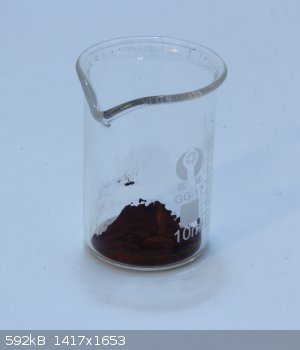
After fully dissolution a dark green solution is formed. If dihydrate Copper(II) chloride is used, about 0,85g are needed.
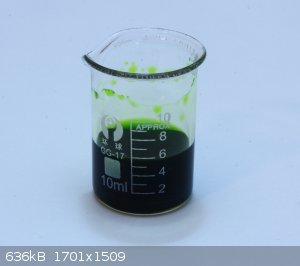
In another bigger Becker 1,84g of Tetraethylammonium chloride monohydrate are dissolved in about 5-10 ml of 95% Ethanol.
The solution of Copper(II) chloride is then added to the Tetraethylammonium chloride solution.
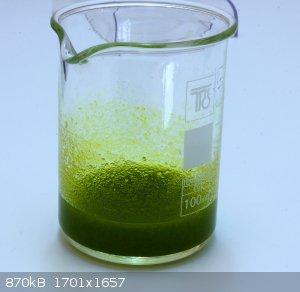
The solution immediately turns cloudy and is heated on an hotplate for a couple of minutes until everything dissolves.
At this point a dark yellow solution is obtained.
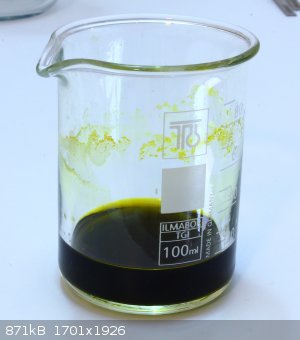 This solution is left to stand at room temperature for about half an hour.
The yellow crystals that precipitate are vacuum filtered and washed
with few milliliters of cold 95% Ethanol. They are then left to dry for some hours and then put in a vacuum desiccator overnight.
0,62g of
yellow.orange crystals are recovered. The complex seems to be quite stable in air, but if put in enough water, it seems to decompose giving a cloudy
blue solution. This solution is left to stand at room temperature for about half an hour.
The yellow crystals that precipitate are vacuum filtered and washed
with few milliliters of cold 95% Ethanol. They are then left to dry for some hours and then put in a vacuum desiccator overnight.
0,62g of
yellow.orange crystals are recovered. The complex seems to be quite stable in air, but if put in enough water, it seems to decompose giving a cloudy
blue solution.
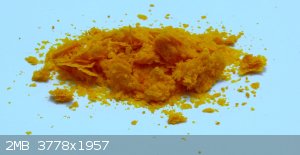
This synthesis is take from Inorganic Synthesis vol.9 Pag 141
The original synthesis used absolute Ethanol, but the reaction also works using 95%.
Maybe using the absolute one the final held could be improved since this complex seems to be quite soluble in water.
Also other metal complex are reported to have very unusual color, like the green manganese complex.
|
|
|
woelen
Super Administrator
        
Posts: 8027
Registered: 20-8-2005
Location: Netherlands
Member Is Offline
Mood: interested
|
|
Interesting find! Getting the tetraethylammonium salt is not easy though. I can obtain tetramethylammonium chloride, but tetraethylammonium salts are
harder to find.
It's most remarkable that you get an orange complex, which dissolves with blue color and precipitates from a dark green solution. It reminds me
somewhat of the experiment I did with CuCl2 in concentrated HCl with CsCl, giving a red complex.
|
|
|
ItalianChemist
Hazard to Others
  
Posts: 172
Registered: 26-1-2011
Location: Italy
Member Is Offline
Mood: No Mood
|
|
I think it should also work with the tetramethylamonium or even triethylammoniun, but maybe the color of the complex could be different.
Even the complex wit tetraethylammonium bromide seems to be purple!
I didn't know about the cesium!I will also try to prepare it!
|
|
|
woelen
Super Administrator
        
Posts: 8027
Registered: 20-8-2005
Location: Netherlands
Member Is Offline
Mood: interested
|
|
The reaction with cesium is described on this web page: https://woelen.homescience.net/science/chem/exps/CsCuCl3/ind...
I do have triethylamine, I'll try formation of complexes of this with copper. IIRC, I once tried formation of a complex with trimethylamine and
copper(II), but that did not work. I just obtained a pale blue precipitate of Cu(OH)2. I expected a deep blue complex, like the complex with ammonia,
but the methyl groups apparently prevent formation of the deep blue complex at the nitrogen atom.
|
|
|
DraconicAcid
International Hazard
    
Posts: 4355
Registered: 1-2-2013
Location: The tiniest college campus ever....
Member Is Online
Mood: Semi-victorious.
|
|
I've made a couple of the tetramethylammonium compounds- tetrachlorocuprate, tetrachloroferrate(III), tetrachlorocobaltate(II), and
tetrachloroiodate(III).
I've tried making the red trichlorocuprates, but without much luck.
Please remember: "Filtrate" is not a verb.
Write up your lab reports the way your instructor wants them, not the way your ex-instructor wants them.
|
|
|
woelen
Super Administrator
        
Posts: 8027
Registered: 20-8-2005
Location: Netherlands
Member Is Offline
Mood: interested
|
|
You tried the red chlorocomplex salt of tetramethylammonium instead of cesium? I also tried that, but it did not work. It did not even produce a
precipitate and the liquid remained green.
|
|
|
chornedsnorkack
National Hazard
   
Posts: 564
Registered: 16-2-2012
Member Is Offline
Mood: No Mood
|
|
Stupid question: this is an example where K and Cs give completely different looking reactions. What does Rb do in the same conditions?
|
|
|
DraconicAcid
International Hazard
    
Posts: 4355
Registered: 1-2-2013
Location: The tiniest college campus ever....
Member Is Online
Mood: Semi-victorious.
|
|
Quote: Originally posted by woelen  | | You tried the red chlorocomplex salt of tetramethylammonium instead of cesium? I also tried that, but it did not work. It did not even produce a
precipitate and the liquid remained green. |
Apparently, you can make ammonium and potassium trichlorocuprates, but none of them have worked well for me.
Please remember: "Filtrate" is not a verb.
Write up your lab reports the way your instructor wants them, not the way your ex-instructor wants them.
|
|
|
woelen
Super Administrator
        
Posts: 8027
Registered: 20-8-2005
Location: Netherlands
Member Is Offline
Mood: interested
|
|
Same to me. With potassium I just get a white precipitate of KCl, and with tetramethylammonium I got no precipitate at all. The liquid in both cases
was olive-green, the color of a concentrated copper(II) solution in concentrated HCl.
|
|
|
chornedsnorkack
National Hazard
   
Posts: 564
Registered: 16-2-2012
Member Is Offline
Mood: No Mood
|
|
The solubilities in water are quoted:
NaCl - 360 g/l (solvent?)@25C, weakly dependent on temperature, mass 58,5 - about 6,15 mol/l solvent
KCl - 340 g/kg (solvent) @20C, mass 74,5 - about 4,55 mol/l solvent
RbCl - 910 g/kg (solvent) @ 20C, mass 120,9 - about 7,5 mol/l solvent
CsCl - 1865 g/l (solvent) @20C, mass 168,4 - about 11,05 mol/l solvent. Expressly readily dissolves in concentrated HCl, in contrast to both NaCl and
KCl
So how does RbCl behave? Does RbCl dissolve in concentrated HCl? Does RbCl form chlorocuprates?
|
|
|
Texium
Administrator
       
Posts: 4618
Registered: 11-1-2014
Location: Salt Lake City
Member Is Offline
Mood: PhD candidate!
|
|
I have a lot of RbCl for sale if you’d like to find out 
|
|
|